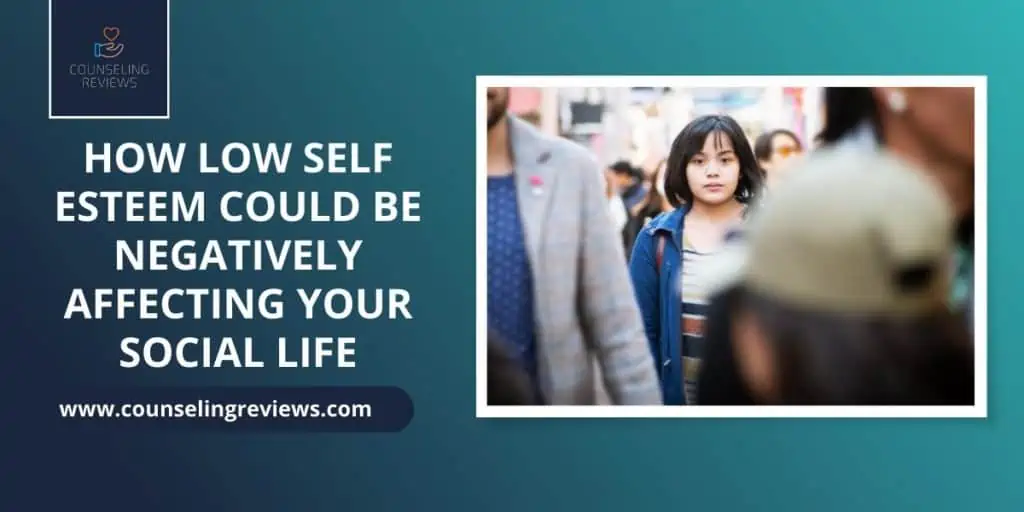Why am I not like the others? Why do I feel so anxious? Can I leave now? Do I have to meet them? Are these a few of the questions that go through your mind whenever you have interactions with others?
This may be an indication that you have some signs of low self-esteem. Low self-esteem is a negative perception of self and the belief that persons share the same view. Being social is a daily occurrence and persons with healthy self-esteem are not impacted negatively when doing this.
The process of socialization is considered vital, as it allows us to learn and reinforce positive qualities and societal norms.
Having negative thoughts can have devastating effects primarily on your mental health. With a negative belief system, your happiness and self-worth are heavily impacted. The dependence on what others may think or do often hinders how you interact socially

Is low self-esteem the same as lack of confidence?
While low self-esteem and lack of self confidence often are related, they are not exactly the same. Low self-esteem refers to a negative overall perception of oneself and a lack of self-worth. It involves deep-seated negative beliefs about one’s value and abilities.
On the other hand, lack of self-confidence is more specific and situational. It refers to the uncertainty or doubt one feels in their ability to perform a particular task or handle a specific situation.
Low self-esteem can be a broader underlying issue that affects overall confidence, but lack of confidence may not necessarily indicate low self-esteem in all areas of life. People who struggle with low self-esteem are consistently afraid of making mistakes or letting other people down.
What causes low self-esteem?
Low self-esteem may arise from a complex interplay of various factors.
Early childhood experiences, such as harsh criticism, neglect, or abuse, can profoundly impact self-perception.
Negative feedback from peers, family, or authority figures can reinforce negative feelings of inadequacy.
Social comparison and unrealistic societal standards may lead to a sense of fear of failure, self-criticism, and worthlessness.
Traumatic life events, such as failures, rejections, or loss, can further erode self-esteem.
Negative thought patterns and cognitive distortions can also contribute to self-esteem issues.
Additionally, personality traits and genetic factors can play a critical role in predisposing some individuals to develop poor self-esteem. Overall, a combination of these factors can contribute to the development of low self-esteem in individuals.
Without further ado, let’s get right to it and find out how a low self-esteem impacts your social life:
Difficulty Maintaining Social Relationships
Feelings of low self-esteem, dread, and anxiety are often felt when an invitation is presented to socialize. The possibility of social interaction initiates defense mechanism avoidance.
The making up of excuses, signing up for an extra shift at work to become unavailable, or just canceling at the last minute. This leads to a breakdown of friendships and even intimate relationships as there is no effort to reinforce personal bonds.
Negative self-talk is carried out by people with low self-esteem because they are unable to effectively process the interactions with others positively and challenge negative thoughts. For example: Why am I not as handsome as him? Why do I not look like her in this dress? Do they notice that I am here? While interacting you constantly doubt and second-guess yourself around others; this fear and lack of confidence can impact your friends and how they interact with you.
Unable to Take Advantage of Opportunities
Social networking is a greatly beneficial activity to engage in periodically. This allows you to make connections and present yourself as a brand. When in social reaction settings, it is noticeable that you are less outspoken and withdrawn than others. This is a reaction to prevent any attention from being focused on you.
The lack of confidence gives individuals a negative impression of your capabilities and how well you communicate with others. It can be interpreted as a lack of interest in what is being offered and the opportunities that could be great for your development, specifically career development.
Abusing Substances
The difficulty experienced when socially interacting may lead to substance abuse. This is another action to try and cope with meeting the expectations of others. The use of alcohol and other drugs removes the inhibition of negative self-talk and negative messages.
This allows for the processing of feedback positively from others and protects the fragile mental state you are in. Alcohol and narcotics can reduce the occurrence of anxiety and physical responses that are not socially accepted. However, this can lead to an inability to control what you say or do.
Emotional Dependence on a Significant Other
The reliance on another person for reinforcement of self-image and potential is often a coping mechanism to function in daily life. This can be very harmful if the significant other uses your low self-esteem as a source of dominance and the possibility for abuse. Constantly seeking approval leads to a dependence on their permission to interact with others.
The reliance on the individual to accompany you to social events can impact your interactions with others. This may deter others from speaking with you and helping when the other person is around.
The dominant individual can take advantage of your vulnerability and portray a negative image of you to others. They can try to isolate you from friends and family, who would like to help with your mental health issues.
How can you improve low self-esteem?
Improving low self-esteem requires dedicated effort and self-compassion. First, challenge negative thought patterns and replace them with positive affirmations. Set realistic goals and celebrate achievements, no matter how small.
Practice self-care and engage in activities that bring joy and fulfillment. Surround yourself with supportive and positive people who uplift you. Seek professional help through online therapy or counseling to explore underlying issues and learn coping strategies. Develop skills and interests to boost confidence.
Remember that self-esteem takes time to build, so be patient with yourself. Cultivate self-acceptance and focus on your strengths, acknowledging that everyone has flaws and imperfections. Embrace self-growth and resilience, and gradually, you’ll notice a positive transformation in your self-esteem.
Conclusion
The effect low self-esteem has on your daily life can be crippling to your social development. What you think of yourself and others is heavily influenced by your self-esteem and may not truly reflect reality. Without getting assistance from a professional, the short-term effects may gradually have long-term implications.
Take the time to analyze, how this is affecting your life and get help from a professional who can assist your confident true self and find the happiness you deserve.
Low Self Esteem Affect FAQs
Self-esteem is an individual’s perception and evaluation of their own worth and value. It is influenced by various external factors too, including past experiences, social interactions, feedback from others, achievements, and personal beliefs about oneself. Positive experiences and support can boost self-esteem, while negative experiences and criticism can lower it.
Low self-esteem can have significant negative effects on a person’s social life. It can lead to anxiety, making social interactions stressful and avoided. Difficulty maintaining relationships may arise due to self-doubt and negative self-talk. Opportunities might be missed as a result of hesitancy and withdrawal, and substance abuse can become a coping mechanism. Emotional dependence on others may also occur, leading to potential exploitation and isolation.
People with low self-esteem often lack confidence in themselves and their abilities. They may struggle to believe in their worth, leading to self-doubt, depression, anxiety and a negative self-perception. Additionally, they may lack assertiveness and find it challenging to express their needs and opinions in social situations, which can further impact their relationships and overall well-being.
Mental health professionals can help boost self-esteem by providing a supportive and non-judgmental space to explore underlying issues and negative thought patterns. They can offer evidence-based therapies, such as cognitive-behavioral therapy (CBT), to challenge and reframe self-doubt and negative beliefs. Through personalized strategies and interventions, they empower individuals to develop healthier self-perceptions and build confidence.




